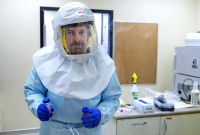Support strong Canadian climate journalism for 2025
A clinical trial is underway in Quebec to see if probiotics can help reduce COVID-19 symptoms and lead to a faster recovery from the viral infection. While this sounds innovative, and is the first trial of its kind in Canada, doctors in China have been using probiotics alongside other COVID-19 treatments since the pandemic began.
The PROVID-19 study, conducted by a multidisciplinary team at the University of Sherbrooke’s medical department, seeks to answer the question: “Can probiotics reduce the duration and symptoms of COVID-19?” researcher Audrey Hamel-Thibault told Canada's National Observer via email.
Probiotics are beneficial micro-organisms, including bacteria, found in the gut, lungs and elsewhere in the body. They help synthesize some nutrients, keep pathogenic (disease-causing) micro-organisms in check and help support the body’s immune system.
Many deaths from COVID-19 are attributed to secondary, opportunistic infections, such as with Streptococcus pneumoniae. Research prior to the pandemic found that certain probiotics significantly reduced cases of ventilator-associated pneumonia in ICU patients and helped them recover faster.
Like vitamin D, which is also part of COVID-19 treatment in some places, probiotics may help prevent the damaging cytokine storms responsible for some of the virus’s worst symptoms.
Cytokines are small proteins released by certain cells, particularly immune cells. The release of too many cytokines causes an inflammatory "storm" that can damage the heart and blood vessels, lungs, digestive tract, liver and kidneys, and even the eyes and brain. Preventing cytokine storms may reduce admissions to the ICU and the need for mechanical ventilation.
Some cytokines are necessary to help the body respond to and kill viruses, however. This means it is important to maintain balance in the immune system, something which probiotics appear to help achieve.
The PROVID-19 study came together quickly thanks to an existing partnership between the university and probiotics provider Lallemand Health Solutions. The university’s research ethics board approved the trial in May, and the team, led by Dr. Jean-Charles Pasquier, aims to recruit 84 patients with COVID-19 convalescing at home.
While this is the first such clinical trial in Canada, China’s National Health Commission suggested using probiotics for the disease as early as February 2020, just as news of the virus (and the virus itself) began spreading worldwide.
However, there “were no supporting data at that time,” says Siew Chien Ng, a professor and associate director of the Centre for Gut Microbiota Research at the Chinese University of Hong Kong (CUHK), who then set out with her colleagues to gather that data. Between February and March 2020, researchers collected stool samples from 15 patients with COVID-19.
“(We) were the first in the world to report that the composition of gut micro-organisms (microbiota) in COVID patients is very different from uninfected individuals,” Ng said. In short, “COVID patients lack certain good bacteria known to regulate our immune system,” she added.
Expanding the study at CUHK, Ng’s team collected data from 150 COVID-19 patients and 1,500 healthy people. Based on those data, they created a formula comprising prebiotics and Bifidobacterium strains to target COVID-19-induced imbalances in gut bacteria, known as dysbiosis.
CUHK’s pilot clinical study showed that more COVID patients who received the probiotic formula fully recovered, said Ng. The probiotic group also developed more antibodies against COVID-19 over the course of two weeks. CUHK’s medical school has applied for patents for the probiotic formula in China and the U.S., and Ng and colleagues are conducting additional clinical trials to see if probiotics could help prevent long-haul COVID-19 symptoms.
Ng noted that recovered COVID-19 patients continue to have high levels of “very abnormal” gut microbiota and low levels of beneficial bacteria compared with healthy people, and that “gut microbiota imbalance with impaired immunity could play a role in ‘long COVID.’”
The Sherbrooke team is also investigating probiotics for long-haul COVID-19. Pasquier said he read the CUHK study with interest and noted “the authors call for more scientific study (of probiotics for long-haul COVID-19) and this is what the PROVID-19 research team is doing.” Doctors Emilia Falcone and Alain Piché, who have set up specialized clinics to evaluate long-haul COVID-19, helped modify the original PROVID-19 trial protocol to extend patient monitoring for up to 55 days.
Without more data, Ng and Pasquier agree it is hard to know which probiotics, if any, work best against COVID-19. There are many products in the market claiming they could boost immunity, Ng says. “However, such claims need further scientific evidence to support.”
“The first step is to demonstrate that probiotics are beneficial for COVID-19 patients,” Pasquier said, and that’s exactly what the PROVID-19 trial aims to do. “If they are effective, even partially, their low cost and accessibility will greatly facilitate their dissemination.”
The Sherbrooke and CUHK studies are not the only ones looking at probiotics for COVID-19. Two earlier studies from Zhejiang province in China suggest people with relatively mild symptoms of COVID-19 were more likely to have received probiotics alongside standard antiviral treatments and that probiotics are likely useful in treating COVID-19.
However, these studies remain unavailable in full in English, illustrating the potential for delays in sharing medical knowledge. Pasquier acknowledged the language barrier: “We made an effort to have students of Chinese origin translate the (latter research paper).”

Vitamins C and D for COVID-19
Probiotics are not the only alternative interventions being investigated as treatments for COVID-19. A number of British hospitals have been treating some COVID-19 patients with high doses of vitamin D, and preliminary studies in France and South Korea have shown promising results.
A study in Montreal is currently examining whether vitamin D might help prevent or treat COVID-19. The PROTECT study, led by Dr. Francine Ducharme from CHU Sainte-Justine and Dr. Cecile Tremblay from the Centre hospitalier de l'Universite de Montreal (CHUM), aims to look at whether high doses of vitamin D could decrease the risk of COVID-19 infection. It will also investigate whether vitamin D might lessen symptoms and expedite recovery in those who are already infected, and impact vaccine response.
Ducharme confirmed via email that the research team began recruiting participants Feb. 8, hoping to assess any “potential benefit impact of vitamin D on the regulation of inflammatory response.” The team aims to gather data from over 2,000 health-care workers in Montreal.
Participants will have their vitamin D status recorded when they are recruited and again at the end of the trial, with some given a placebo and others given an initial "loading dose" of 100,000 IU vitamin D3 plus 10,000 IU weekly.
“We are targeting health-care professionals working in high-incidence areas with no or little vitamin D supplementation,” Ducharme said.
About one-third (32 per cent) of Canadians have concentrations of vitamin D below the level to maintain bone health, with 10 per cent deficient in vitamin D, according to the latest Canadian Health Measures Survey by Statistics Canada.
Vitamin D is created when skin is exposed to sunlight, and synthesis of the nutrient declines with age. This means that deficiency is more likely in the Northern Hemisphere, in individuals with darker skin and in older adults and those who get little outdoor time, including people in long-term care facilities.
Results of the PROTECT study will not be available for many months, but there is a growing consensus among clinicians internationally that correcting vitamin D deficiency could reduce the risk of COVID-19 infection, the severity of symptoms and the risk of death. Taking high-dose vitamin D supplements is not recommended, however, for anyone whose vitamin D levels are already considered adequate.
Another team at the University of Sherbrooke is currently investigating the potential benefits of vitamin C for COVID-19. The LOVIT study dates back to 2018 and intended to assess whether high-dose intravenous vitamin C reduced mortality or persistent organ dysfunction in septic ICU patients. Patients with COVID-19 are now being included in this study, which wraps up in December.
Researchers in Canada are clear that we do not yet fully understand the impact of nutritional interventions such as vitamins C and D. As for probiotics, when asked how physicians in Canada should respond to patients asking about probiotics for COVID-19, Pasquier said, “create ambivalence,” stressing that we do not yet know if probiotics are effective in reducing the impact of COVID-19.






Comments
This is not really a responsible title for this article, which describes unproven or ill-defined therapies, and suggests that Canadian medical practices are lagging behind. It is perhaps interesting to read about a few approaches that are being studied, but when the results are inconclusive or still pending, a lay news publication should not be presenting this information as news to act upon. There was a publication just this past week in JAMA showing no benefit from a high dose of vitamin D for COVID. Was it the wrong vitamin D dose, or timing, or method of administration, or vitamin D is just not of value? And "probiotics" is a huge catch-all term. The subject of a healthy microbiome and its potential important impacts on many serious illnesses is of vital interest, but there is not as yet any broadly accepted strategy for improving or optimizing the microbiome, for various conditions, and there's potential for harm as well as benefit, depending on circumstances. I enjoy National Observer, but please don't venture into trying to interpret complex and urgent medical research issues, from a "what could be the harm?" viewpoint. It smacks too much of Donald Trump, and his genius instincts about hydroxychloroquine. There is far too much medical misinformation already in circulation on the topic of COVID, and it would be naive to think that politics isn't playing some role in what rises to the top on any given day. Please don't add to the confusion.
Thank you D Senzi. You echo my thoughts exactly.